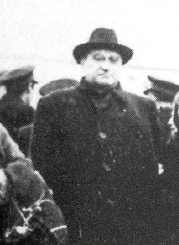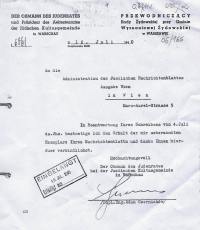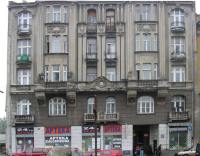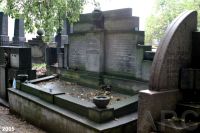 |
| Adam Czerniakow * |
Adam Czerniakow was born in
1880 in
Warsaw. After completing his studies in
Warsaw
in chemistry at the
Warsaw Polytechnic, he went on to study industrial engineering in
Dresden (Germany). Shortly before WW1 he became involved in Jewish public life.
He dedicated himself to defending and promoting the interests of Jewish craftsmen
and he published extensively on subjects concerning Jewish artisans, many of his
articles appearing in the "
Hantverker – Zeitung", the publication of the General
Association of Jewish Craftsmen.
In the
1924 yearbook of that association, published on the 10th
anniversary of its founding, Czerniakow published a long article outlining a comprehensive
programme for vocational training and technical schools. He taught for many years in the
Warsaw Jewish community’s vocational schools.
Czerniakow took a stand against compulsory unionisation of craftsmen in a lecture
delivered to the First Congress of Jewish Artisans on
5 October 1925,
the address was later published as a booklet. He was active in the struggle against the
1927 Guild Law, which in effect ousted Jewish workers from
their jobs and shops.
Czerniakow was a member of the Engineers Association, known for its assimilations stand,
but on the other hand he joined the Jewish Nationlist Minority Block, established to
counteract attempts of Polish reactionary elements to squeeze minority representation out of Parliament.
From 1927 to 1934, Czerniakow was the elected representative of
Jewish artisans, on the National Jewish list, in the
Warsaw Municipal Council.
He played an active part in the
1928 Sejm and Senate elections and
participated in the campaign for Jewish minority rights led by
Yitzhak Gruenbaum. He spoke out against government discrimination and persecution.
In the
1931 by-elections he won a place in the Senate, but the
Pilsudski Government dissolved the Senate and Sejm before the first seitting.
Before the outbreak of WW2, he was nominated to the appointed Executive Council of the
Warsaw Jewish Community, as a representative of the Jewish craftsmen. He also chaired that
councils education department. Together with
Maurycy Mayzel, Marek Lichtenbaum, and
Labedz, he was a member of the
Warsaw delegation to the
1939 General Congress of Polish Jewry for Eretz Israel.
On
23 September 1939, in the midst of the siege by the Nazis,
Stefan Starzynski, the mayor and commissioner for civil defence, had appointed him
“Head of the Jewish Religious Community". On
4 October, a few days
after the city’s surrender, Czerniakow was taken to
Szucha Avenue,
the Police and Gestapo HQ in
Warsaw where he was ordered to
add 24 people to the Community Council and to serve as its head.
 |
| Czerniakow Letter * |
Official titles used by Czerniakow until the
middle of 1941 were
"Head of the
Judenrat" and "President of the Jewish Religious Community of
Warsaw".
From the
middle of May 1941 his functions and authority were
defined in the ghetto, as corresponding to those of the Mayor in the Polish part of the city.
Czerniakow kept a diary throughout his time as Chairman of the
Judenrat, and this will
be referred to, as appropriate.
The first
Judenrat, established in
October 1939, consisted of
some of the following members:
A. M. Hartglass, Samuel Zygelboym (Zygielbojm), Isaac Meir Lewin,
Abraham Weiss, Abraham Gepner, Josef Jaszunski, and
Stanislaw Szereszewski.
Groups arose in the ghetto which tried to oust Czerniakow and some of them like the “13”,
led by
Abraham Gancwajch, who enjoyed the support of
members of the German Police and SD. All these attempts failed as Czerniakow was
supported by the Civil Authorities within the
Generalgouvernement.
Regarding
Gancjwajch, in Czerniakow’s diary, his feelings
are clear, as recorded on
25 February 1942:
"
I had a visit in my office from Gancwajch,
with pleas of a personal nature. What a despicable, ugly creature."
Czerniakow endeavoured to prevent the direct intervention of the German authorities
and sought to organise the internal affairs of the Jews with the minimum of outside involvement.
Whilst no proof exists of Adam Czerniakow contact with the Jewish Underground or siding
with political activists, he personally promoted education for the ghetto’s children and strove
to save Jews being put to death.
Czerniakow sought ways to influence the Germans and arouse some sort of sensitivity to
and consideration for the ghetto, but these failed, he did however, gain a measure of
understanding through his ties with the Ghetto Commissioner,
Heinz Auerswald.
Auerswald fooled
Czerniakow, by hiding the real facts of the Final Solution.
In Czerniakow’s diary, the entry for
19 January 1942:
"
I have heard that Auerswald had been
summoned to Berlin. I cannot shake off the fearful suspicion that the Jews of
Warsaw may be threatened by mass resettlement."
Views on Czerniakow personality are mixed, some Ghetto Chroniclers such as
Emanuel Ringelblum, and
Yitzhak Katzenelson were
severely critical, seeing Czerniakow as an assimilator who mixed with assimilators,
a man lacking close contact with the Jewish masses. However, people who worked
closely with Czerniakow, such as
Stanislaw Adler,
who worked for the Jewish Order Service, and then the Director of the Office of
Housing in the
Warsaw Judenrat, wrote :
"
Adam Czerniakow was an experienced social and community
worker and a model of the well–read, hard working, good willed man, but he was
simply unable to make a decision."
Czerniakow worked tirelessly for the good of the ghetto, with endless struggles with the
Nazi authorities over funding for the ghetto, noted with wry humour, on
11 June 1941:
"
In the morning at the Community. It has been raining. Fortunately for
us this does not entail any cost to the Community."
 |
| Czerniakow's Apartment |
Czerniakow and his wife
Niunia, their only son
Jas,
fled to Soviet occupied territory, lived from
November 1940
in an apartment at
11 Elektoralna Street, and subsequently at
Chlodna Street.
His entry for
25 January 1942 reads:
"
In the morning at the Community. A nocturnal fantasy:
I was born on Zimna Street, and want to die on
Chlodna Street."
( In Polish – Zimna means Cold Street, Chlodna means Cool Street)
Just before the deportation, Czerniakow wrote on
19 July 1942 in his diary:
"
In the morning at the Community. Incredible panic in the city.
Kohn, Heller, and Ehrlich are spreading terrifying
rumours, creating the impression that it is all false propaganda. I wish it were so.
On the other hand, there is talk of about 40 railroad cars, ready and waiting. It transpired
that 20 of them have been prepared on SS orders for 720 workers leaving tomorrow for a camp.
Kohn claims that the deportation is to commence tomorrow at 8 p.m., with 3,000 Jews
from the Little Ghetto. Because of the panic I drove through the streets of the entire Quarter.
I visited 3 playgrounds. I do not know whether I managed to calm the population, but I did my best."
Czerniakow was obviously very concerned about the fate of the Jews, as the entry
for
20 July reveals:
"
In the morning at 7:30 at the Gestapo. I asked
Mende
how much truth there was in the rumours. He replied that he had heard nothing. I turned to
Brandt, he also knew nothing. When asked whether it
could happen, he replied that he knew of no such scheme. Uncertain, I left his office.
I proceeded to his Chief, Kommissar Bohm. He told
me that was not his department, but Hohmann might say
something about the rumours. I mentioned that according to rumour, the deportation
is to start tonight at 7:30. He replied that he would be bound to know something,
if it were about to happen.
Not seeing any other way out, I went to the deputy chief of Section 111,
Scherer. He expressed his surprise hearing the rumour and
informed me that he too knew nothing about it. Finally I asked whether I could tell the
population that their fears were groundless. He replied that I could and that all the talk
was Quatsch und Unsinn (utter nonsense).
I ordered Lejkin to make the public announcement through
the precinct police stations. I drove to Auerswald. He informed
me that he reported everything to the SS-Polizeiführer. Meanwhile
First went to see Jesuiter and
Schlederer, who expressed their indignation that the rumours
were being spread and promised an investigation."
On
22 July 1942, Czerniakow recorded in his diary:
 |
| Czerniakow's Grave |
"
Sturmbannführer Höfle and
associates came at 10 o’clock. We were told that all Jews irrespective of sex and age,
with certain exceptions, will be deported to the East. By 4 p.m. today a contingent of
6,000 people must be provided."
On the last day of his life, Czerniakow wrote:
"
23 July 1942 – In the morning at the Community.
Worthoff from the deportation staff came and we discussed several
problems. When I asked for the number of days per week in which the operation would
be carried on, the answer was 7 days a week."
Later the same day, Czerniakow decided to take his own life, by swallowing a potassium
cyancide tablet. Before, swallowing the tablet, he wrote two letters, one to the Jewish Council
executive and the other to his wife, saying:
"
They are demanding that I kill the children of my people with my
own hands. There is nothing for me to do but to die."
Photos:
Yad Vashem
*
GFH
*
Sources:
The Warsaw Diary of Adam Czerniakow – Yad Vashem 1979
The Jews of Warsaw 1939-1943- Yisrael Gutman- Harvester Press
In the Warsaw Ghetto – Stanislaw Adler – Yad Vashem 1982
© ARC 2005










